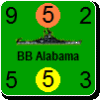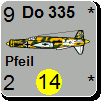Turn 1. Sep/Oct 1939 (fd). USSR & Japanese Cease Fire.
Because of the "early warning" apparently offered by the Soviets and the mostly fine weather this long turn, Japan was able to capture the remaining 2 Soviet Asian RPs and the segment of the trans-Siberian railway hexes connecting them to Manchuria and Japanese controlled ports. Thus, allowing for the shipment of all 4 captured Soviet Asian RPs to Japanese controlled factories assuming the necessary CPs.
The "early" warning provided by the Soviets likely prevented the Japanese from prematurely railing out the Yamamoto HQ-A and other units to beef up their positions in China. As it stood this turn, it was after the Japanese captured the remaining 2 RPs and needed rail hexes before they railed these units out.
Interestingly, I think the Japanese player fully assumed that the Soviet player would enforce a peace. If so, according to the rules this peace would be a pact and maintained by garrison ratios similar to the Nazi-Soviet pact. Which meant that both the Soviets and Japanese beginning in 1940, assuming a pact in Sep/Oct 1939, would have to maintain the appropriate garrison levels in order for the other side to not to be able to break the pact and go to war again. This peace would also mean that the Soviets would no longer be at war with a major power and would then be required to take only a combine or pass and be only to save 1 (additional) oil per turn.
Apparently the Soviet player had other plans. He leveraged the facts that Japan had begun their pull out of Manchuria and Soviet Asia to China and that since Japan controlled Vladivostok he could wait and force a peace during any turn he wished. He didn't have to force one now. He used these facts to negotiate a ceasefire that would be renegotiated every year and that would not require any garrisons by either side. More significantly the Soviet player would technically remain at war with a major power which would allow him and the CCP to take full land impulses and save as much oil as they wished.
The German player didn't seem at all happy with this ceasefire as this gives the Soviet player significantly flexibility in moving and redeploying his forces in Eastern Europe. Well I guess you can't make everybody happy.
So while the Soviets lost Soviet Asia and 4 RPs they did gain 3 Persian oil, the ability to take full land impulses and no need to maintain any forces in Soviet Asia. Though, 2 of the Persian oil are a bit tricky to get anywhere without CPs in the Persian Gulf. But apparently that's acceptable to the Soviet player.



















